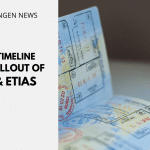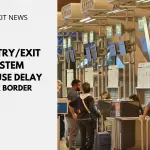Netherlands Prepares For Entry/Exit System
There will be major changes to the way the European Union manages its external borders in 2023 and the Dutch government is preparing for the new changes.
Changes will come into force in May 2023 when the EU entry and exit system (EES) starts operating. All non-EU nationals arriving and leaving the Schengen area will be registered under a new border-check system. By the end of 2023, non-EU nationals from visa-free countries will have to apply for an electronic travel authorisation called ETIAS to be able to access Schengen states.
This authorisation will have to be presented to border guards upon arrival.
In the Netherlands, the EES system will be implemented at international border crossing points in alignment with the EES Regulation, as a spokeswoman for the justice ministry pointed out.
‘This applies to the maritime and air border crossing points, including Hoek van Holland, IJmuiden, Schiphol, Rotterdam airport as well as at the stations in Rotterdam and Amsterdam for the Eurostar train,’
Spokesperson From Netherlands Justice Ministry
According to reports, the Dutch government plans to introduce mobile apps and self-service kiosks where third-country nationals, including British citizens, can register prior to their visit. In addition, E-gates will also be available to non-EU citizens.
Related articles:
- Non-EU Must Register For Entry-Exit System (EES) – ETIAS
- EU Warning: ETIAS Not Yet Operational
- ETIAS: EU Will Start Charging Visitors To Enter in 2023
- Spain’s Popular Tourist Hotspot Considers Reintroducing Covid Restrictions
- British Passport Fees To Increase From February
- EU Border Control to Launch Entry-Exit System (EES)
Who Will Implement Entry/Exit System
All Schengen Member countries will start operating the Entry/Exit System in addition to Iceland, Liechtenstein, Norway, and Switzerland, while non-EU Schengen countries like Bulgaria, Cyprus, Ireland, and Romania will be excluded.
The system will be used at external border crossing points to record the data of arriving and leaving visitors from non-Schengen countries. The data required includes the person’s name, travel document, biometric data such as fingerprints, places of entry and exit, in addition to the length of their stay.
EES system will automatically scan passports and border guards will no longer be required to check or stamp documents, while data will be stored in an EU-wide database for three years, being renewed with each entry.
Every entry or exit has to be registered, which indicates that visitors are required to have their documents scanned. EU citizens and nationals from third countries that are residing in the Schengen area, make an exception, which means they are free of registering with the EES system.
Concerns On The New System
In hopes of protecting Schengen and tightening checks on third-country nationals, the EU has been preparing for years to introduce EES and ETIAS.
This EES is created in a bid to increase border security and identify visitors that exceed their short-stay permits in the Schengen area, which results in illegal migration. Nationals from EU visa-free countries are allowed to visit the EU for stays of up to 90 days every 180-day period.
The EES system also intends for the better identification of terrorists, suspects, criminals, and victims of crime. The EES will help secure system loopholes such as unchecked migrants in the Schengen area to be identified and promptly processed. This means those who break the rules will get caught the second they enter or exit Schengen, as their biometric data will be stored.
On the downside, the Entry-Exit System will lead to longer border delays, at least during the initial period of registrations. Additionally, there are some concerns regarding information security, considering that the system will include a huge database of sensitive information about the millions of people travelling to the EU each year.
What are your thoughts on this issue? Talk to us in the comment section below. Or if you need more advice on the above, contact us for further travel & immigration advice.
Check out the deals we have found below and tell us your travel plans.
Check out the offers and discounts from:
And because of the pandemic, don’t forget to get your travel insurance, which will cover you for flight disruptions and pandemic related matters.
IaM can help with your visa application to Europe, the United States, the UK & other countries
If you need help with a US visa, a UK Visa, or a visa to Europe, including help with appointment booking obligations, IaM can help. For more information and advice on US immigration, UK immigration law and US visa applications or if you need any help or assistance please, reach out to your Visa Coordinator at IaM.
Some of our posts include affiliate links. If you choose to purchase any of these products, we might get a small commission. For more information, check out our TOS.
- UK Aims to Attract Global Talent with Easier Visa Routes - 29 June 2025
- France Strikes Again: What Travellers Need to Know About July Flight Disruptions - 28 June 2025
- EU Reforms Hand Luggage Fees - 27 June 2025











